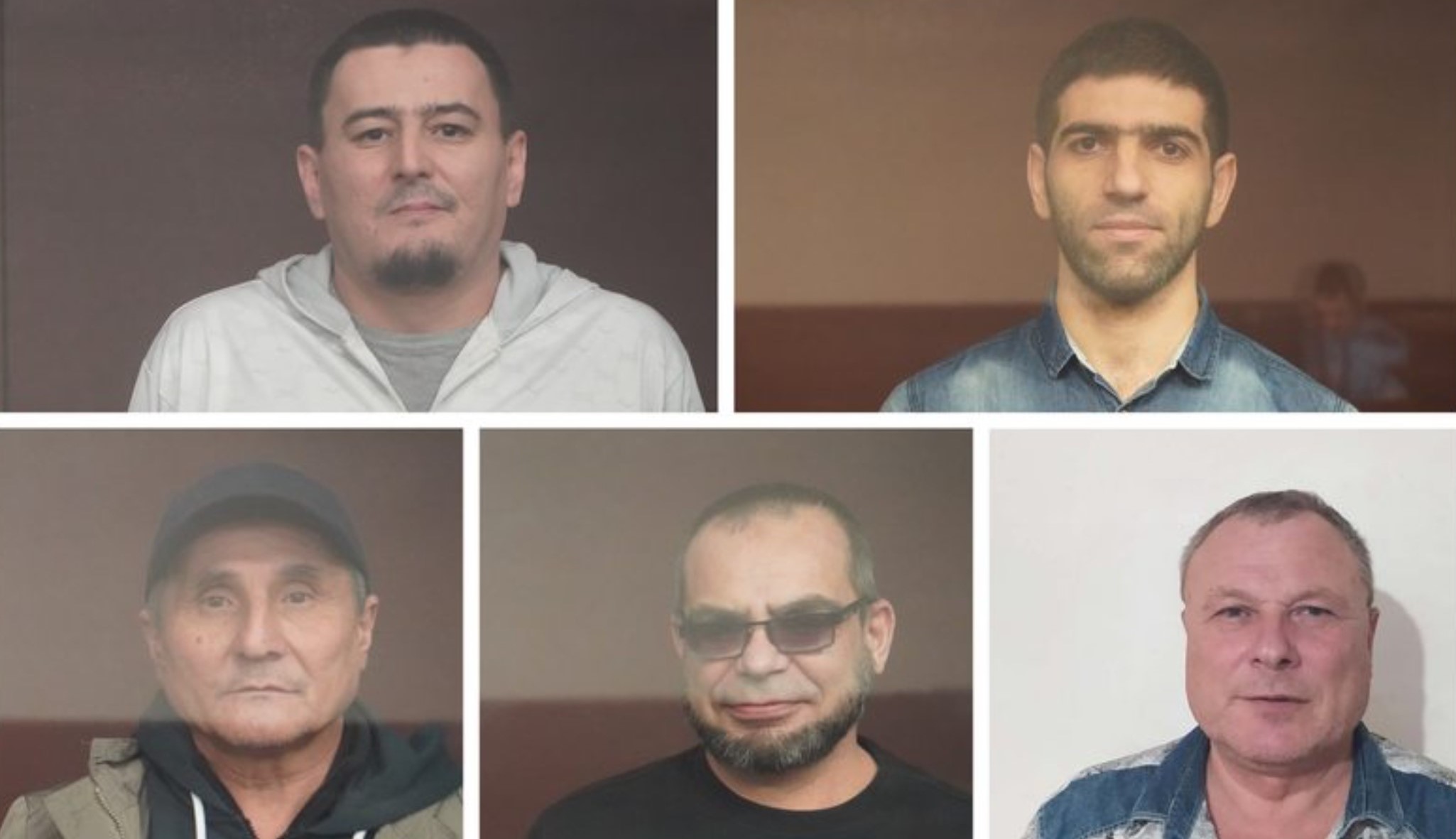• Topics / Freedom of conscience and religion
Crimean Tatar journalist and activists face huge sentences in Russia’s retaliation for humiliating attack by Ukraine

Crimean Solidarity journalist Vilen Temerianov and four other Crimean Tatar political prisoners are facing sentences on absurd charges of up to 20 years, with the Russian prosecution’s only ‘evidence’ coming from a conversation about prayer and fasting which the Russian FSB illicitly taped in a mosque eight years ago. Aside from this undisputed, and innocuous, conversation, there are only the unprovable claims made by ‘anonymous witnesses’ who have demonstrated blanket amnesia for any details that do not repeat, almost verbatim, the prosecution’s indictment.
The men’s ‘trial’ is taking place at the Southern District Military Court in Rostov (Russia), a court that has been notorious for sentencing Crimean Tatar and other Ukrainian political prisoners to huge terms of imprisonment since soon after Russia’s invasion of Crimea.
During the hearing on 18 December, the prosecution presented their recording of the conversation in a mosque back in 2015, with the defence asking that this be listened to in full. According to lawyer Emil Kurbedinov, a range of issues were discussed regarding obligatory daily prayers and fasts. There was, of course, nothing at all about terrorism or extremism, Kurbedinov says, adding that this yet again exposes the real nature of such prosecutions in which charges of ‘terrorism’ are based solely on harmless conversations.
The issue here is not only that there was nothing at all criminal about a discussion on prayer and fasting. If Russia’s FSB seriously believed that the discussion in a mosque pointed to ‘terrorist’ activities or plans, why did they wait seven years before arresting the men?
Kurbedinov is convinced that the FSB pulled the recording out of their archives for political reasons. He notes that politicians, the media and the FSB themselves all claimed that “a terrorist cell controlled from Ukraine” had been eliminated. This is a narrative, he says, dictated by the events since February 2022 (i.e. Russia’s full-scale invasion of Ukraine).
Russia has been using flawed ‘terrorism’ charges as a weapon against Crimean Tatar civic journalists and activists involved in the Crimean Solidarity human rights movement since 2017. There was, however, a glaringly obvious new political element in the arrests of Temerianov and the other men in August 2022.
There were huge explosions at the Saki air base in Russian-occupied Crimea on 10 August 2022. Although the Russian defence ministry claimed that this had merely been an explosion of some munitions, satellite images showed that the likely Ukrainian strike had destroyed seven Russian military planes and damaged others.
Russia has responded to all humiliating military losses through savage retaliation, almost always against Ukrainian civilians. Direct reprisals are, however, difficult if Moscow is, at the same time, claiming that the losses never happened.
In the early hours of 11 August 2022, armed Russian enforcement officers burst into the homes of six Crimean Tatar families in Dzhankoi and the surrounding area. It was through these arrests of men who had committed no crime and terrorisation of their families that the FSB claimed to have “broken up a terrorist cell controlled from Ukraine”.
The FSB’s attempt to link the new arrests with Russia’s war of aggression against Ukraine was especially cynical given that these were the latest template copies from the same conveyor belt of repression that Russian unleashed in early 2015. Since then, well over a hundred Ukrainian Muslims, most of them Crimean Tatar journalists or activists, have been imprisoned on profoundly flawed ‘terrorism’ charges. The FSB cite, as justification for ‘terrorism’ charges a suspiciously secretive and probably politically motivated Russian supreme court ruling from 2003. That declared the peaceful transnational Muslim organization Hizb ut-Tahrir to be a ‘terrorist’ organization, without providing any explanation. No other country considered Hizb ut-Tahrir terrorist, and the organization is legal in Ukraine. As an occupying power, Russia would, under circumstances, be in violation of international law by applying its own legislation in Crimea. Here it is using false ‘terrorism’ charges as a weapon to try to crush the Crimean Tatar human rights movement.
The FSB invariably designates at least one person, in this case, civic activist Enver Krosh (b. 1991) as ‘organizer’ of a supposed Hizb ut-Tahrir group under Article 205.5 § 1 of Russia’s criminal code. Crimean Solidarity civic journalist Vilen Temerianov (b. 1985); Seitiaha Abbozov (b. 1957); Rinat Aliev (b. 1964); Edem Bekirov (b. 1976) are accused of ‘involvement’ in this supposed group, under Article 205.5 § 2. In occupied Crimea, Russia also adds an extra, preposterous, charge of ‘planning to violently seize power’, under Article 278.
The only ‘evidence’ comes from illicitly taped conversations, generally on religious topics or about Russia’s religious and political persecution. These are sometimes inaccurately translated, and are invariably given suspect ‘assessments’ by FSB-loyal ‘experts’. There are also secret / anonymous ‘witnesses’ who may not even know the defendants, with the presiding judge (in this case Timur Mashukov) allowing such secret testimony, despite the lack of any legitimate grounds, and blocking questions that prove that such witnesses are not telling the truth. There have been occasions when it was clear that somebody else was in the room and likely prompting this purported witness, with that also ignored by the panel of judges (more details here).
As mentioned, there were six arrests on 11 August 2022. In April 2023, it was learned that the sixth and youngest of the men, Murat Mustafayev, had been sentenced to four years’ imprisonment for supposed involvement in Hizb ut-Tahrir. This was the fastest ‘trial’ to date, and shortest sentence against a Ukrainian citizen on these charges. It is, unfortunately, likely that Mustafayev was forced to do more than merely ‘admit guilt’ (details here). Seitiaha Abbozov was, at least, placed under house arrest, however the other four men were first imprisoned in occupied Crimea, and are now in a SIZO [remand prison] in Rostov.
The next hearing is scheduled for 15 January 2024.





